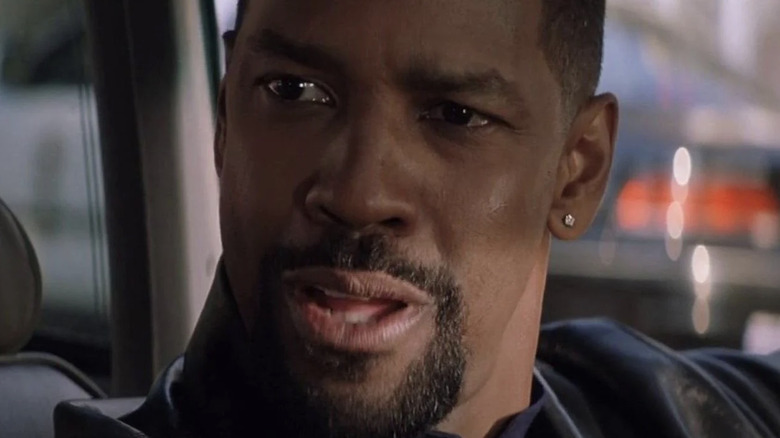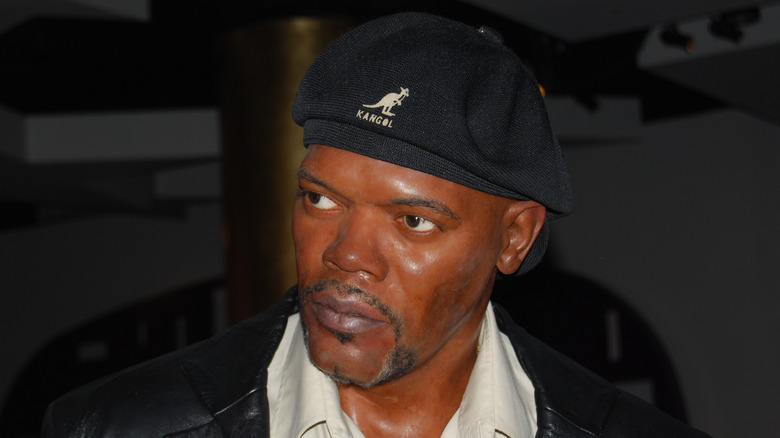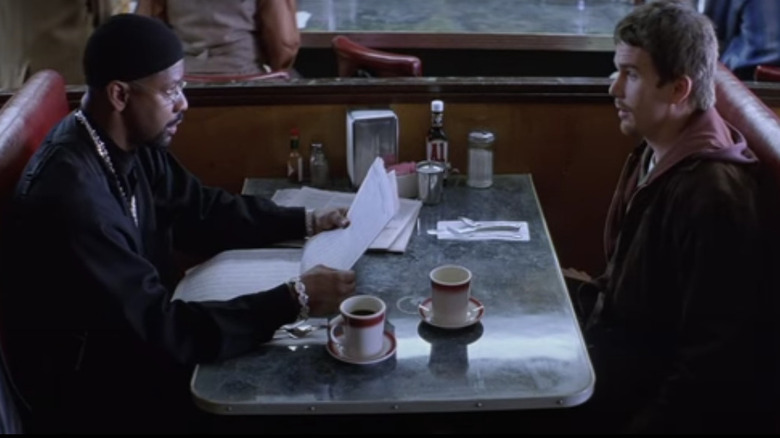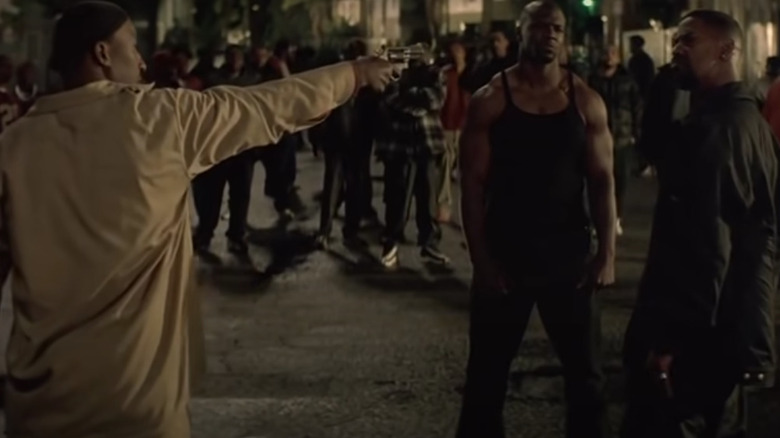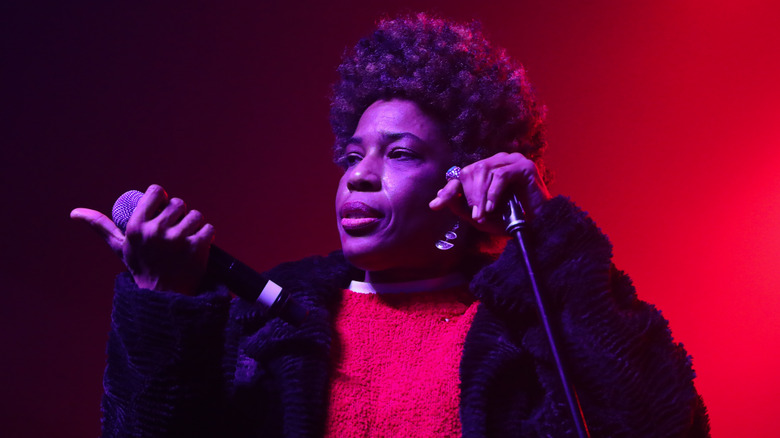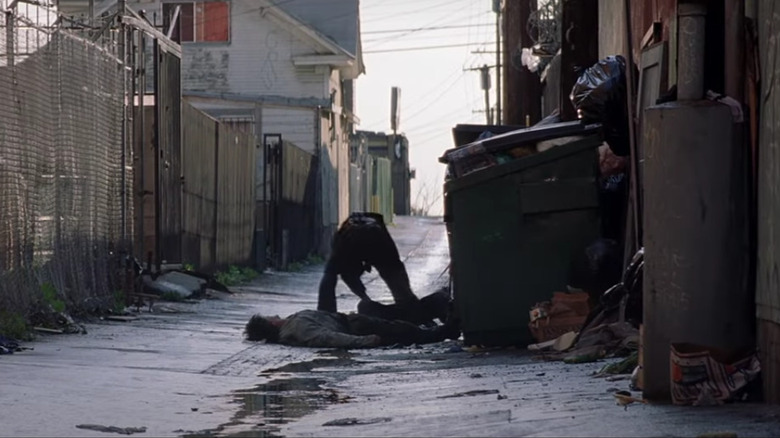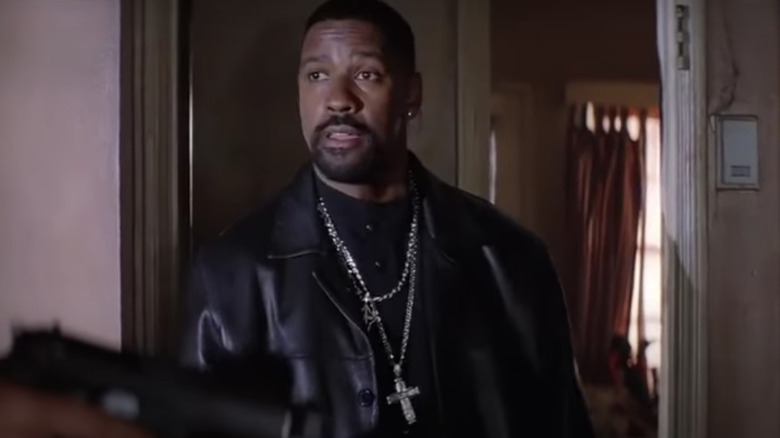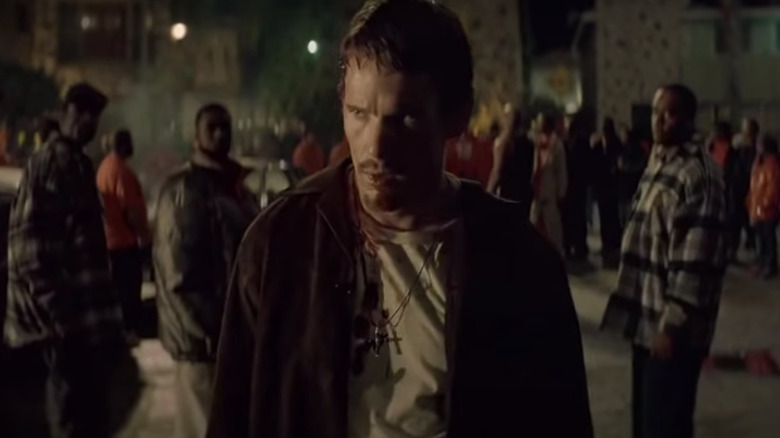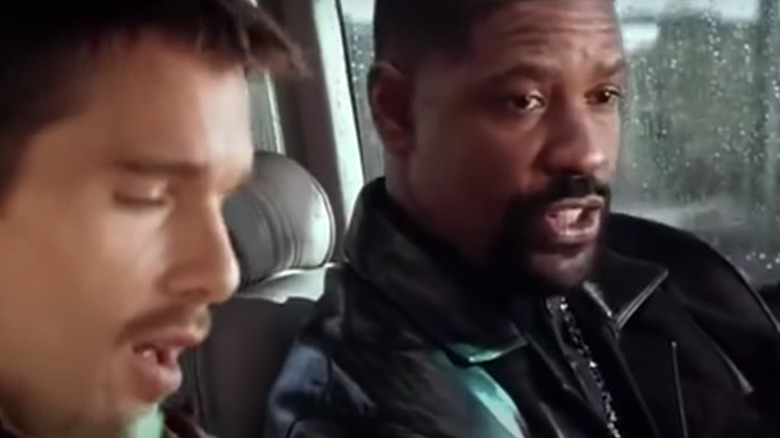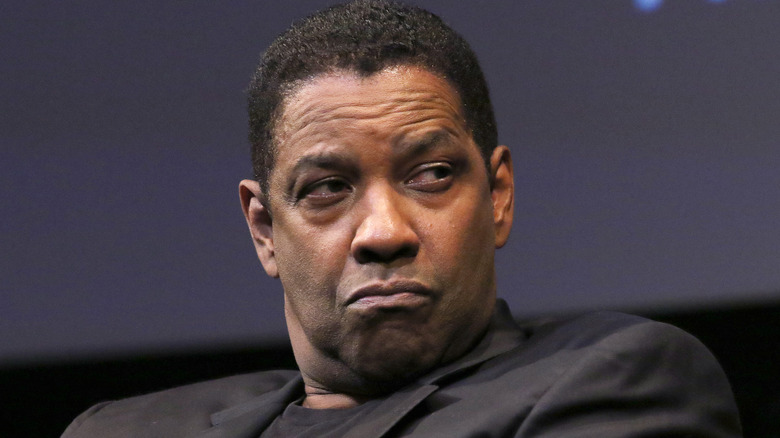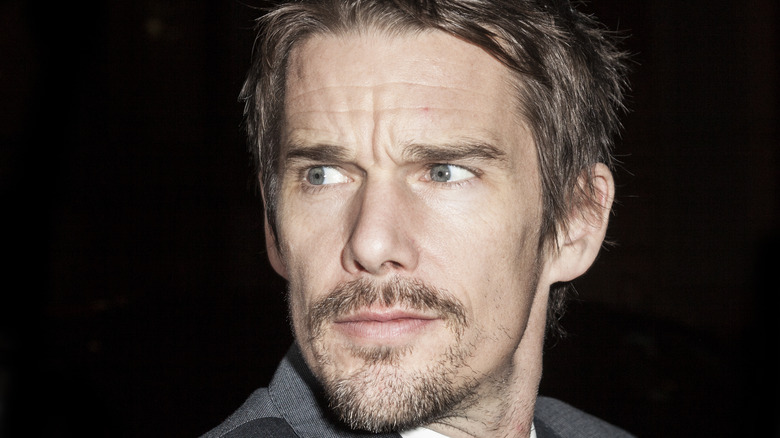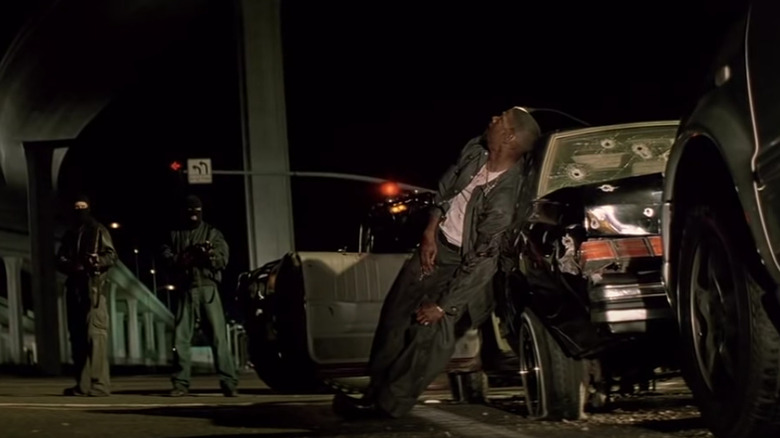The Untold Truth Of Training Day
We may receive a commission on purchases made from links.
The first day on any job is a white-knuckled, stomach-churning, wild-eyed roller-coaster ride; it's the nature of the beast. Making a solid, lasting first impression isn't easy when your co-workers and boss are making snap judgements about your worth as an employee and human being. It's often a trial by fire, for sure.
Such is the case for Jake Hoyt (Ethan Hawke) in the 2001 Antoine Fuqua-directed, David Ayer-penned classic "Training Day." An aspiring LAPD officer, Hoyt has only one shift to prove he's got what it takes to make the grade as a street-savvy, all-action, no-nonsense narcotics cop. It's a tough gig, particularly because Hoyt also has to contend with the highly-decorated, seasoned Detective Alonzo Harris (Denzel Washington, in an Oscar-winning role) who wastes no time in telling the nervous rookie: "I ain't babysitting. You got today and today only to show me who and what you're made of."
Alonzo, of course, isn't your average white-collar boss. He has a habit of referring to himself as a wolf, shouts "Boom!" constantly, and lovingly rubs his two Smith & Wesson pistols together when he's excited. Alonzo's sole mission in life seems to be taking good cops, dragging them through the sewers of society, and turning them bad.
With the cop classic centered on corruption and its corrosive influence turning 20 this year, now seems like the ideal time to uncover some details about the film that even its biggest fans might not know. Because just like Roger's "three hundred dollars a glass" whiskey, it gets better with age.
Samuel L. Jackson was the first choice for Alonzo
In retrospect, it's hard to imagine anyone but Denzel Washington doing justice to the charismatic complexity, haunted air, and seasoned cool of Alonzo. But believe it or not, the film was originally developed for Samuel L. Jackson to star in, alongside Matt Damon. The two actors would have had completely different chemistry, of course, to castmates Washington and Hawke, making for a completely different "Training Day."
One could imagine that Damon would have been a more heroic, wholesome Hoyt, while Jackson would have played Alonzo perhaps even more ruthless, with less of the nuanced ambiguity Washington ultimately brought to the role. When Ethan Hawke was originally cast in the film, he believed Nick Nolte would be his co-star. Supposedly, Bruce Willis also passed on the role of Alonzo, while Christian Bale turned down Hoyt. Those two, together on the rampage at that point in their careers, could have been an interesting pairing but certainly would have changed the film's exploration of racial dynamics between white and Black cops.
Another wild report says that Eminem also shunned the role of Hoyt, determined to instead concentrate on the development of his acting debut in Curtis Hanson's "8 Mile." A list of other actors reportedly in consideration at some point reads like an early '00s heartthrob list: Tobey Maguire, Ryan Phillippe, Paul Walker, Freddie Prinze Jr. and Scott Speedman.
Ultimately, Fuqua decided Hawke possessed a quality none of those others had. "There's something innocent about Ethan, he's such a nice guy," the director said in a behind-the-scenes documentary about the making of the film. "But there's something in his eyes that tells you he's seen something."
The coffee shop has appeared in a lot of other films
Our first introduction to Alonzo is at the coffee shop, where he sits regally, clad in black, reading his morning newspaper. The crooked cop exudes an air of mystery from the get-go, giving off the engaging, elusive vibe of a chess grandmaster. The real life name of the coffee shop was The Quality Cafe, and until 2006 it was a real diner at 1236 West 7th Street in Los Angeles.
Even after the Quality Cafe closed, it continued to be a valued Hollywood location for film shoots, appearing in films like "Catch Me If You Can," "Gone in 60 Seconds," "Million Dollar Baby," "Old School" and "Ghost World." It is also the cafe in "Se7en" where Morgan Freeman meets Gwyneth Paltrow for a chat. Check out this cool video compilation of many different films set at the coffee shop. It's almost like Nic Cage and Scarlett Johansson are hanging out — or Morgan Freeman is simultaneously having conversations with two different people.
Unfortunately, for anybody wishing to play Alonzo for the day and sit moodily in the coffee shop whilst waiting for your witless, fresh-faced rookie to turn up, it's not going to happen. In 2014, the space was refurbished and turned into a bar/nightclub.
Denzel Washington improvised the famous King Kong line
The "King Kong" speech in "Training Day," when Alonzo finally realizes the game is up, might just be the scene where everyone realized he was going to win the Oscar. As his character's world unravels, Denzel gives a masterclass in what happens to a man who values absolute control as he realizes he's lost every inch of it.
Alonzo has spent 13 years as a cop at this point, but when the streets (and his past) catch up with him, he doesn't go gently into that good night. Instead, he rages like a nuclear warhead. After being shot in the butt by Hoyt and dismissed as done, dusted, and over by the residents of The Jungle, Alonzo knows he's all out of options and goes into full-on flip mode.
Hoyt has walked away with the Russians' money, and Alonzo threatens his former street "buddies" with jail and arson for not coming to his aid. Alonzo punctuates the point by booming "King Kong ain't got s**t on me!" It's a line that did not appear in the Ayers-written script, instead improvised by Washington on the spot. One by one, Alonzo's audience departs until he's left alone to smoke one last cigarette and muse, "I'm winning anyway, I can't lose. You can shoot me, but you can't kill me." A few moments later, the Russians prove him wrong.
Macy Gray took a role just to get a picture taken with Denzel
Flashback to 2001, when Macy Gray was a full-fledged cultural phenomenon, whose cigarette-stained raspy voice belting out the hit song "I Try" was inescapable. Sure enough, Hollywood came calling — and a handful of small roles in films like "Training Day," "Scary Movie 3" and the Steve Coogan/Jackie Chan bomb "Around the World in 80 Days" followed.
The singer didn't sign on for her guest role to cash in on overnight fame, however. According to Gray (who is still active and recently appeared on the Australian version of "The Masked Singer"), she just wanted to impress the woman who gave birth to her.
"I wanted to get a picture with him for my mom," she said in a 2021 interview promoting her latest film, a horror flick called "Phobias." "That was my entire inspiration for doing that movie. I had no interest in acting."
Nevertheless, Gray was impressive as an agitated, gum-chewing wife whose larger-than-life fingernails often threaten to eclipse the scene.
At the risk of ranking musician cameos in the film, Gray can't hold a torch to Snoop Dogg's star turn as the wheelchair-bound drug dealer Blue, but she is light years ahead of Dr. Dre's dismal outing as the characterless cop Paul. Gray admits she was a bit camera-shy, but Washington gave her the confidence to simply go for it.
"I got to the set and realized, 'Oh my god I don't know what to do,'" she recalls. "So I asked Denzel. I went to his trailer and he said, 'Just do yourself as your character.' You know, which is basically what he is a master at."
L.A's most dangerous locations were used
One of the main characters in "Training Day" isn't any actor at all, but is L.A.'s filthy, fearsome streets. The freeways, sidewalks, back alleys, and projects that Alonzo and Hoyt prowl like street-walking cheetahs, hot on the scent of any wrongdoing or opportunity, are the beating, all-singing, all-dancing heart of the film. For "Training Day" to find this edge and authenticity, the location had to have that air of menace only the grittiest neighborhoods could provide.
If a film crew were to simply begin filming in certain gang-ruled territories of South Central Los Angeles at the time this film took place, however, it might start trouble with local gang members. So, to overcome the obstacle, a deal was struck.
In notorious Baldwin Village to the Imperial Courts housing project, Fuqua's street background (he grew up in a Pittsburgh ghetto) helped him film in places where Hollywood had never been allowed before.
"All the locations are real," production designer Naomi Shohan has said of the film's authenticity. "All the interiors done on stage were taken from the locations and researched in the neighborhoods with the help of the residents. We sort of became urban anthropologists." From Crenshaw, Hawthorne, and Rampart to Palmwood Drive, Watts, and the Imperial Courts Housing Project, "Training Day" was determined to keep it real.
Alonzo is based on real LAPD officers
As terrifying as this may be to hear, Denzel's corner-cutting, crime-enabling cop wasn't a hundred percent fictional.
The opening few minutes of "Training Day" leave the viewer with little doubt that Alonzo is a one-of-his-kind, unstoppable force of nature who talks the talk and walks the walk. While this is partly due to Denzel Washington's acting chops and the quality of the script, it's also because both reportedly had a real-life blueprint: disgraced Puerto Rico-born cop Rafael Perez and ex-LAPD Officer David Mack.
Perez, who would later have his name legally changed to Ray Lopez, was a central figure in the Rampart scandal, a headline-making explosion of deep-seeded police misdeeds that would also inspire such movies as "Crash," "Street Kings" and of course, the 2011 Woody Harrelson film "Rampart," as well as the long-running TV series "The Shield." Mack, a fellow member of the Rampart Division's Community Resources Against Street Hoodlums (CRASH) unit, was arrested in 1997 after robbing a South Central Los Angeles bank.
In the 2003 book "Bad: Infamy, Darkness, Evil and Slime on Screen," writer Aaron Baker (himself the author of "Beyond the Thin Line of Black and Blue: Movies and Police Misconduct in Los Angeles") claims that the character of Alonzo is an attempt to depict the rare mix of magnetism, animalism and cold-blooded cruelty such corrupt cops would need to possess. "The characterization in 'Training Day' of bad cop Alonzo Harris is a composite of the Rampart villains Perez and Mack [former LAPD officer David Mack, who was also involved in the Rampart Scandal]: both Latino and African American, part cop and part gang-banger," he says. "Like both officers, Harris is a serious player with a Salvadoran mistress who recalls Veronica Quesada, the Honduran amante (lover) of Rafael Perez."
Upon his arrest, Perez cut a deal with the prosecuting team and, during a series of interviews, spilled the beans on the CRASH teams' epidemic corruption; eventually, he would serve three years of a five-year sentence. Mack, the former partner of Perez, was sentenced to 14 years in prison in conjunction with the bank robbery. Oddly enough, both officers have been rumored for years to have been involved with the death of The Notorious B.I.G.
According to PBS, upon the release of Perez, he told the court: "The us-against-them ethos of the overzealous cop began to consume me. We vaguely sensed we were doing the wrong things for the right reasons. Time and again, I stepped over that line. Once crossed I hurdled over it, again and again, landing with both feet, sometimes on innocent persons."
It sounds like something Alonzo Harris might say. Further adding to the film's realism, eagle-eyed viewers might notice Alonzo's license plate reads "ORP 967," which reportedly alludes to Officer Rafael Perez, born in 1967.
There could have been a Training Day 2
Some films you don't want to end, and as soon as the credits roll you can't help but wonder: "In this golden age of lucrative franchises and endless spin-offs, will there be a sequel?" In the case of "Training Day," a sequel without the magnetic pull and world-conquering presence of Alonzo Harris should have been dead in the water. Yet that didn't stop CBS from launching a "Training Day" TV series with Bill Paxton in 2017.
Bearing little relation to the film, and set 15 years later, the show's only similarities were the intended exploration of the dynamic between a fresh-faced rookie and a jaded cop for whom corruption was commonplace. The series lasted 13 episodes, and shortly after Paxton passed away in February of 2017, the series was cancelled.
In 2019, reports surfaced that Warner Bros was planning a "Training Day" prequel. Scripted by Nick Yarborough, the film would put viewers ten years before the events of the original movie, with a younger Alonzo on the move during the L.A. riots, before corruption had completely overtaken him. Two years later, there have been no updates on the project, so for now "Training Day" fans will have to keep an ear on the police scanner for further reports.
Denzel and Hawke were consumed by their roles
Alonzo Harris and Jake Hoyt are both big characters who approach things from separate ends of the scale, but they share core personality traits. The same can be said for Denzel Washington and Ethan Hawke, who were so busy getting into character and finding out what makes them tick that the duo have admitted in interviews that they were consumed by the roles.
"A lot of my rehearsal for 'Training Day' was riding around undercover, and getting learning about it," Hawke recalled in a 2015 interview. "Denzel and I would meet these guys. We'd ride around with them. I did a bunch of ride-arounds on my own. I was trying to figure out what the reality-this was at a time period when the CRASH units in LA were ... there was a lot going on with that. It was a part of the news. It was really extremely interesting."
Of course, all this contributed to the film's realism, but so did the conviction of the two lead actors. Washington and Hawke would reportedly become so engrossed in their roles at times that when director Antoine Fuqua yelled cut, they would continue riffing off one another as their fictional counterparts.
Denzel Washington turned out to be very good at playing a bad guy
Denzel Washington has become renowned for playing complex characters, morally ambiguous and sometimes flat-out bad to the bone. He's an A-lister unafraid to put on the bad guy hat, get his hands dirty and defy audience expectations. Yet, it's worth remembering that before "Training Day" was released in 2001, the world hadn't really seen Washington play a flat-out villain before, and audiences were surprised at just how good he was at it.
According to Ethan Hawke, Denzel had a tough time making the career shift. "The NAACP came to the set and said, 'What are you doing?' he recalled in 2015. "And Denzel, I remember him saying, 'What, Al Pacino can play a bad guy? Gene Hackman can play a bad guy? I can't play a bad guy? I'm an artist. That's how I lead, not by being some dubious role model, by only playing squeaky-clean people. I'll be a role model by being great at my job.'"
Training Day reinvigorated Eva Mendes' faith in acting
Playing the part of Alonzo's girlfriend Sara, Eva Mendes only had a bit part in "Training Day," but it was certainly an eye-catching one. Antoine Fuqua's masterpiece also put Mendes on the map, and she credits it with reaffirming her faith in acting.
"I know I walk a fine line between being a respected actor and being what they call a sex symbol," Mendes said in a 2010 interview, reflecting on films like "Training Day" that require some degree of nudity. "But I've never felt objectified. Nothing you see me do is an accident. I've never had a problem with nudity, but I don't put it out there without a reason. I'm not an exhibitionist. But, honestly, for my art, I'll do anything almost. I'll go there."
A few years earlier, Mendes had credited the film with saving her career. "I was ready to quit acting," she recalled of the time, when her work had mostly been in music videos and bit parts on TV shows. "Then I got to work with Denzel, and then it just happened. I was like this is why I do this, for this connection, and to work opposite Denzel Washington. That really sparked and ignited me."
Training Day opened Ethan Hawke's eyes to police corruption
If "Training Day" has a theme it's corruption, and how prevalent it is in all sections of society. Playing the role of a rookie cop trying to do the right thing in the face of a hard-bitten cynic whose moral compass began misfiring a long time age, Ethan Hawke's eyes were opened to the widespread problem of cop corruption.
In a 2015 interview, Hawke recalled that he spoke to many cops who had given him real-life examples of how the streets could corrupt you through a series of tough choices. "Real life compromise, that was really interesting to me," he said, remembering one police officer who pocketed two kilos of cocaine, thinking he would let someone off who was being framed and instead do good with it. "The first thing he did with it was he sold half of it for information about another crime. And he found a dead body and he got a conviction by selling the thing. And it started a path of breaking the law; that just showed how gray the line was ... he was saying that this is how he started breaking the law because it was all in the name of good ... the slope first gets slippery."
In a 2001 interview, Ayer and Fuqua stressed that burdening cops with an abundance of rules and not providing them the proper resources creates an atmosphere for such misdeeds. "There are cops who break the law to take out the lawbreakers. And some cops break the laws to enrich themselves," Ayer said. "One I can justify. Others I can't." Echoing the sentiment, Fuqua added that he saw Alonzo as a "victim of the system ... one sick, depressed, far-gone guy."
In the original script, Alonzo survived
When Alonzo finally goes out in a hail of bullets at the end of "Training Day," it's a fitting finale. He may have bragged to Hoyt a few hours earlier that, "I walk a higher path son. I can give you the keys to all the doors." Yet in truth, the gold-wearing philosopher cop is on a road of self-destruction, architecting of his own demise. T
A happy ending would not have rung true, and sure enough there's no happily ever after for Alonzo — not even in the form of some serious jail time. So, in the film's climax the Ethan Hawke character says "You know what I learned today? I'm not like you!" Before ripping off the corrupt cop's badge and leaving him to face his fate.
According to Denzel Washington, however, in the original script Alonzo (who the actor calls his all-time favorite role) nearly walked into the sunset to falsely arrest another day. "In the original script he did," Washington said in a public appearance. "But I was not having it."
